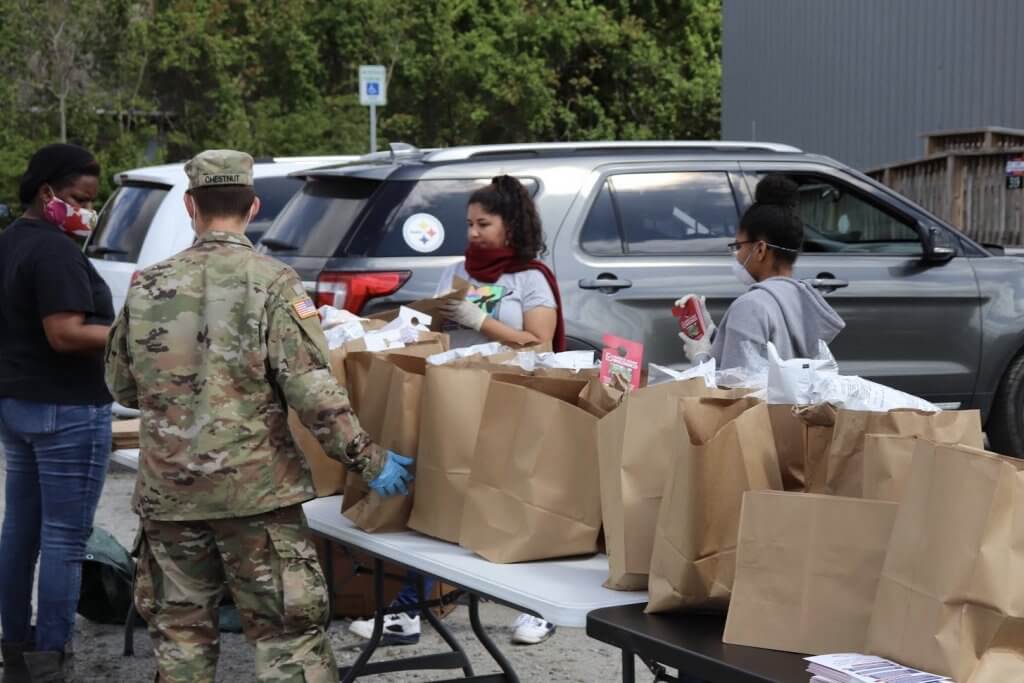When he’s not training or on a mission with the Maryland National Guard, Spc. Casey Ayers works as a private food distribution driver in the Old Line State. As COVID-19 necessitated the expanded role of soldiers and airmen across Maryland, he felt right at home.
The mission for his unit? Delivering hot meals and food supplies to vulnerable community members, among other virus-related jobs.
“The food distribution sites have been the best because you get to interact with the public,” Ayers said. “They get to see that the National Guard isn’t necessarily scary.”
Since March, when activation orders were issued from state government, blessing COVID-vulnerable Marylanders has been an official part of the Guard’s job (federal orders rolled down on April 3). The order to help where necessary with virus-related efforts currently runs through May 8 but may be extended another month.
Capt. Nicholas Riesett, commander of D Company, 1-175th Infantry, says that approximately 1,000 men and women have participated for weeks with food projects. Last weekend, for instance, Guard members in Salisbury helped prepare or bag nearly 800 meals for distribution. Dozens of other sites are sprinkled throughout the state, including 13 stations throughout Dorchester County.
“We’re linking up with lunch ladies,” Riesett said. “Every organization we’ve worked with — whether schools or churches — they’ve all had their stuff together. There hasn’t been an instance where they’ve been unprepared, and we’ve been able to fall in line and help them out where they need it.”
Partnering with local food banks, charities, churches and school networks, Riesett’s men and women have worked to primarily support school-aged children and their families who may be missing meals. Other units, such as the 115th Military Police Battalion, are concentrating on homeless encampments or other vulnerable populations.
“Saturday [in Salisbury] was really cool; the people we were working with were super-positive and energetic,” Riesett said. “The people were thankful, saying ‘Thanks for your service,’ giving thumbs-ups and smiles all around. Everyone’s making the best of it.”
Food bags may include items like tuna, meat donated from Perdue Chicken, hot dogs, rice, peas and carrots. A common distribution method is the “drive-through,” where patrons pull up to a public school or other community gathering space, lower their rear windows and have the bag deposited straight into their backseats. Occasionally, Guard members and other volunteers walk door-to-door to deliver meals to those who cannot leave their homes.
Ayers has participated in the Dorchester County projects, as well as assisting with state testing sites at Timonium Fairgrounds.
“The people we see definitely seem to be appreciative,” he said. “I don’t think they’re necessarily upset at us, but people do seem to be down about the current situation, so they definitely appreciate receiving the aid and support.”
A new mission working with the Salvation Army in Baltimore starts this week for the 1-175th. Guard members will meet at Camden Yards — home of the Baltimore Orioles — then ride with Salvation Army workers to different worksites throughout the city.
“We have to remind ourselves that it could always be worse, and that keeps us positive and moving forward,” Ayers said. “You don’t necessarily dwell on the negative things, but try and make an impact on other people moving forward.”
Indeed, Riesett points out that the National Guard was designed for times exactly like these — and they’re accomplishing exactly what they set out to.
“Everyone’s supporting right now in one way or another, whether setting up tents, establishing test facilities in support of local authorities or handing out food,” he said.
Ayers echoed his statement. “This gives a sense of purpose in our serving, when we actually do something real-world and not just train.”

